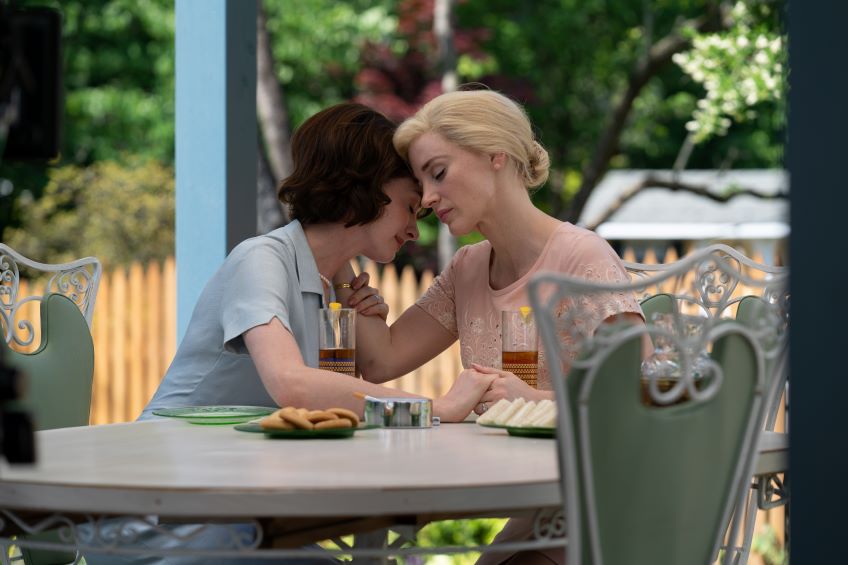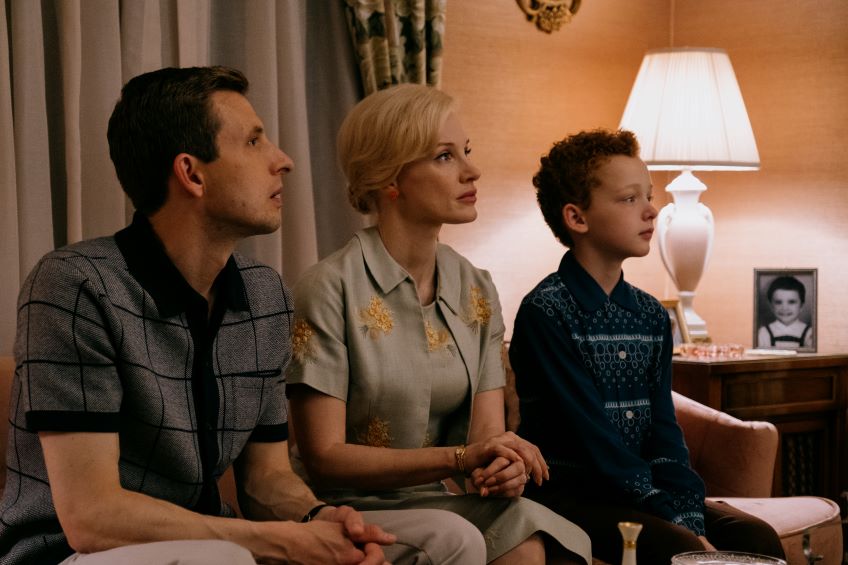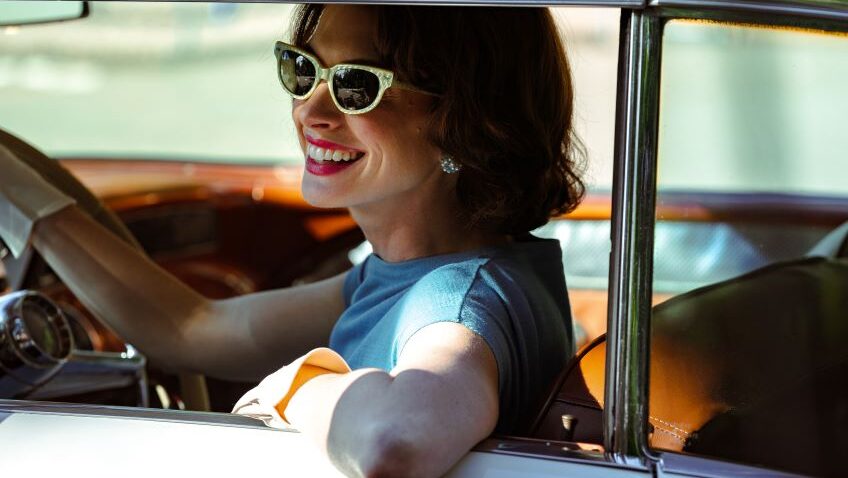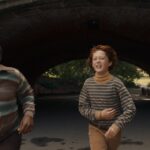Joyce Glasser reviews Mothers’ Instinct (March 27, 2024) Cert 15, 97 mins.
French cinematographer-turned-director Benoît Delhomme’s psychological thriller is a half-hearted mix of Douglas Sirk’s All that Heaven Allows, Richard Alfred Marquand’s Jagged Edge and Alfred Hitchcock’s Suspicion. But actually Delhomme’s directorial debut is based on Olivier Masset-Depasse’s film, Duelles which in turn was based on Belgium author’s Barbara Abel’s 2002 novel L’Instinct maternel, and which Abel revised and re-wrote as her English language debut, with the title Mother’s Instinct.
When the film opens Alice (Jessica Chastain) is plotting a break-in. When her next door neighbour and best friend Céline (Anne Hathaway) gets into her car for the school run, Alice uses her key, enters Celine’s house, closes the curtains and takes a big knife from a drawer. We fear the worst but the joke is on us. It’s preparation for a surprise birthday party and Alice’s gift is an expensive pearl necklace. It’s also (spoiler alert) a bit of foreshadowing in reverse.
At first glance next door neighbours Céline and Alice live carbon copied Stepford Wives’ lives. Both are stunning, immaculately groomed housewives who are great hostesses and never go to the gym, or anywhere without their high heels, but never gain weight. Both dress impeccably just to hang around the house and are married to dull but dependable high earners: Damian (Josh Charles) Simon (Anders Danielsen Lie).

Their adjacent houses are too big for a family of three. Either the large suburban house is a status symbol, or the couples intended to have big families. In fact, each has one eight-year-old son and the young boys, Alice and Simon’s son Theo (Eamon Patrick O’Connell) and Céline and Damian’s son Max (Baylen D. Bielitz) are best friends.
But early on in a throwaway line that is key, the best friends express admiration that Jackie Kennedy is pregnant on the campaign trail. Are we supposed to be mindful that two of her babies died in infancy and one was stillborn? The subject of babies broached, Céline confesses she wouldn’t mind having a sister for Max, while Alice misses her life as a journalist and wants to go to work.
But there’s a problem (and it’s not that both actresses are in their forties). Céline cannot have any more children and Simon wants another baby while Alice doesn’t. Simon might have been promoted to accounts manager recently but he’s an insensitive dud. He asks Alice why she has to work pointing out he earns a good living and suggests she fulfil her ambition writing for the school newspaper.
When tragedy strikes, the couples realise that their fragile façade has been cracked. Can a friendship, let alone a marriage survive the pain, the guilt, the unspoken recriminations – and perhaps, deep down, the jealousy?
Fate has taken its toll on all the characters. As the sole survivor of a car crash that killed her parents when she was a child, Alice has had mental health issues causing Simon to doubt her and attribute her instincts to her childhood trauma.
There was always something strange about Theo, or perhaps he sensed that his mother would rather be working. Never particularly affectionate with Alice, he is morose for an 8-year-old, and becomes increasingly taciturn with his eyes turning spookily dead.

The clueless, one-dimensional men get short shrift. The film is a platform for two A-list actresses and their characters’ friendship is convincing. Hathaway and Chastain know each other from two previous films, Interstellar and Armageddon Time, although in these films they did not get a chance to act off one another.
Here they do it in spades and it’s just as well, as Sarah Conradt’s screenplay (with Abel) cannot decide if the film is a melodrama, a psychological horror film, or a kitschy send-up. It could be there are not enough ideas to sustain the tension for the film’s duration. The last fifteen minutes feel over-the-top.
The echo from Douglas Sirk is found in the manicured suburban gardens (Delhomme is also the cinematographer); the stay-at-home wives with repressed needs; the tension in their superficially perfect lives and the early 1960s costumes (kudos to the costume department). Films like Jagged Edge come to mind because we are meant to share Alice’s confusion about Céline’s motivations and intentions, guilt or innocence.
Yet far from keeping us guessing, the filmmakers arm us with dramatic irony. The clues are hardly subtle and the way the actresses are filmed makes the desired guessing game superfluous. Suspicion is what drives the story and no one does suspicion better than Hitchcock. But Hitchcock was a moraliser who might not have been satisfied with the outcome.




